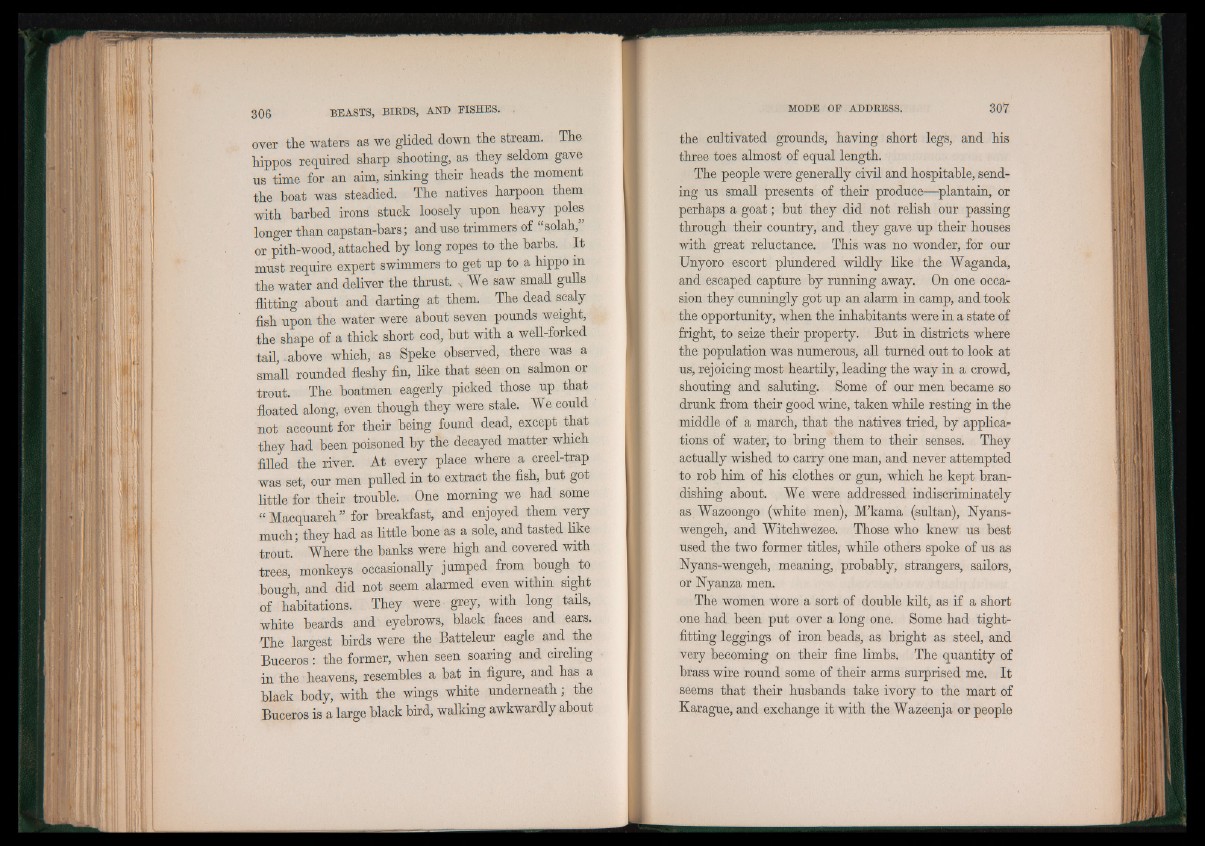
over the waters as we glided down the stream. The
hippos required sharp shooting, as they seldom gave
ns time for an aim, sinking their heads the moment
the boat was steadied. The natives harpoon them
with barbed irons stuck loosely upon heavy poles
longer than capstan-bars; and use trimmers of “solah,”
or pith-wood, attached by long ropes to the barbs. It
must require expert swimmers to get up to a hippo in
the water and deliver the thrust. N We saw small gulls
flitting about and darting at them. The dead scaly
fish upon the water were about seven pounds weight,
the shape of a thick short cod, but with a well-forked
tail, -above which, as Speke observed, there was a
sma.ll rounded fleshy fin, like that seen on salmon or
trout. The boatmen eagerly picked those up that
floated along, even though they were stale. We could
not account for their being found dead, except that
they had been poisoned by the decayed matter which
filled the river. At every place where a creel-trap
was set, our men pulled in to extract the fish, but got
little for their trouble. One morning we had some
“ Macquareh ” for breakfast, and enjoyed them very
much; they had as little bone as a sole, and tasted like
trout. Where the banks were high and covered with
trees, monkeys occasionally jumped from bough to
bough, and did not seem alarmed even within sight
of habitations. They were grey, with long tails,
white beards and eyebrows, black faces and ears.
The largest birds were the Batteleur eagle and the
Buceros: the former, when seen soaring and circling
in the heavens, resembles a bat in figure, and has a
black body, with the wings white underneath; the
Buceros is a large black bird, walking awkwardly about
the cultivated grounds, having short legs, and his
three toes almost of equal length.
The people were generally civil and hospitable, sending
us small presents of their produce—plantain, or
perhaps a goat; but they did not relish our passing
through their country, and they gave up their houses
with great reluctance. This was no wonder, for our
Unyoro escort plundered wildly like the Waganda,
and escaped capture by running away. On one occasion
they cunningly got up an alarm in camp, and took
the opportunity, when the inhabitants were in a state of
fright, to seize their property. But in districts where
the population was numerous, all turned out to look at
us, rejoicing most heartily, leading the way in a crowd,
shouting and saluting. Some of our men became so
drunk from their good wine, taken while resting in the
middle of a march, that the natives tried, by applications
of water, to bring them to their senses. They
actually wished to carry one man, and never attempted
to rob him of his clothes or gun, which he kept brandishing
about. We were addressed indiscriminately
as Wazoongo (white men), M’kama (sultan), Nyans-
wengeh, and Witchwezee. Those who knew us best
used the two former titles, while others spoke of us as
Nyans-wengeh, meaning, probably, strangers, sailors,
or Nyanza men.
The women wore a sort of double kilt, as if a short
one had been put over a long one. Some had tight-
fitting leggings of iron beads, as bright as steel, and
very becoming on their fine limbs. The quantity of
brass wire round some of their arms surprised me. It
seems that their husbands take ivory to the mart of
Karague, and exchange it with the Wazeenja or people